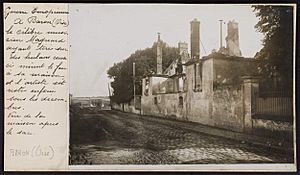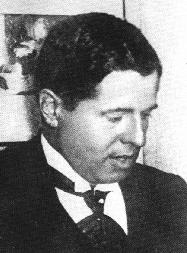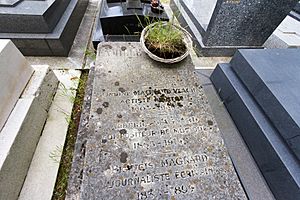Albéric Magnard facts for kids
Albéric Magnard (born June 9, 1865 – died September 3, 1914) was a French composer. He is sometimes called a "French Bruckner" because of his grand musical style. Magnard became a national hero in 1914. He bravely defended his home from German soldiers during World War I and died protecting it.
His Life Story
Albéric Magnard was born in Paris. His father, Francis Magnard, was a very successful writer and editor of a famous newspaper called Le Figaro. Even though his family was wealthy, Albéric didn't want to use their money or connections to get ahead. He wanted to succeed in music based only on his own talent. He didn't like being called "fils du Figaro" (son of Le Figaro).
After serving in the military and finishing law school, he decided to study music. He went to the Paris Conservatoire, a famous music school. There, he learned about counterpoint (how different melodies fit together) and took classes from Jules Massenet, a well-known composer. He also met Vincent d'Indy, who taught him fugue (a type of musical chase) and orchestration (how to write music for an orchestra). Magnard wrote his first two symphonies while studying with d'Indy. He even dedicated his first symphony to d'Indy. They always respected each other, even though they had different political views. Magnard supported Alfred Dreyfus, a military officer who was wrongly accused of treason.

Albéric's father, Francis, tried to help his son's music career while still respecting Albéric's wish to do it on his own. This included promoting his music in Le Figaro. When his father passed away in 1894, Albéric felt a mix of sadness, thanks, and a bit of frustration towards his father.
In 1896, Magnard married Julie Creton. He also started teaching counterpoint at the Schola Cantorum, a music school founded by d'Indy. Around this time, he wrote his Symphony No. 3.
His Brave Death
In 1914, when World War I began, Magnard sent his wife and two daughters to a safe place. He stayed behind to protect his family home, the "Manoir de Fontaines," in Baron. When German soldiers entered his property, Magnard bravely fired at them, killing one soldier. The soldiers fired back and then set his house on fire.
It is believed that Magnard died in the fire. His body could not be found in the ruins. The fire also destroyed many of his musical works that had not yet been published. This included the full orchestral music for his early opera Yolande and most of his opera Guercoeur. Luckily, a composer named Guy Ropartz had heard parts of Guercoeur before. He was able to remember and rewrite the lost parts of the music. Because of his efforts, Guercoeur was finally performed in Paris in 1931.
His Music
Magnard's music was mainly influenced by other French composers, especially César Franck. While he spent a lot of time writing operas, he is best known today for his four symphonies. Some parts of his symphonies show influences from German composers, even hinting at the music of Gustav Mahler.
He often used fugues and chorales (hymn-like melodies) in his music. The grand and powerful sound of his orchestral works led some to call him a "French Bruckner." In his operas, Magnard used a technique called leitmotiv. This is where a short musical idea represents a character, place, or idea, similar to how Richard Wagner used them.
Magnard didn't write a huge amount of music, only 22 main works. Besides his symphonies and operas, he wrote some chamber music. This includes a string quartet (for four string instruments), a quintet for piano and wind instruments, a piano trio (for piano, violin, and cello), a violin sonata, and a cello sonata. A few more pieces were published after he died, like a set of four songs for a baritone singer and piano.
Selected Works
- Three Pieces for piano
- Suite in the Old Style, for orchestra
- Six Poems, for voice and piano
- Symphony No. 1 in C minor
- Yolande, opera
- Symphony No. 2 in E
- Promenades, for piano
- Quintet in D minor, for piano, flute, oboe, clarinet & bassoon
- Funeral Song
- Overture
- Symphony No. 3 in B-flat minor
- Guercoeur, opera
- Sonata in G, for violin and piano
- Hymn to Justice
- Four Poems, for baritone and piano
- String Quartet in E minor
- Hymn to Venus
- Trio in F minor, for piano trio
- Bérénice, opera
- Sonata in A major, for cello and piano
- Symphony No. 4 in C-sharp minor
- Twelve Poems
- In God my hope
- To Henriette
See also
 In Spanish: Albéric Magnard para niños
In Spanish: Albéric Magnard para niños



